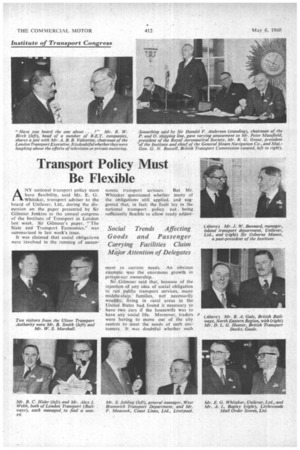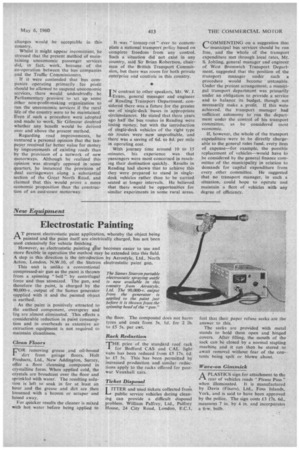Transport Policy Must Be Flexible
Page 100

Page 101

If you've noticed an error in this article please click here to report it so we can fix it.
ANY national transport policy must have flexibility, said Mr. E. G. Whitaker, transport adviser to the board of Unilever, Ltd., during the discussion on the paper presented by Sir Gilmour Jenkins to the annual congress • of the Institute of Trarisport in London last week. Sir Gilmour's paper, " The State and Transport Economics," was summarized in last week's issue.
It was claimed that social obligations were involved in the running of uneco nornic transport services. But Mr, Whitaker questioned whether many of the obligations still applied, andsuggested that, in fact, the fault lay in the national transport policy not being sufficiently flexible to allow ready. adjust
rent to current needs. An obvious eXample was the enormous growth in priVa.th-car ownership.
Sir', Gilmour said that, because of the rejection -of any idea of social obligation to rim' public transport services, many middle-class farriilies, not necessarily wealthy, living in rural areas in the United. States had found it necessary tp have two cars if the housewife was to have any social lift. Moreover, traders were having to move out of the city centres to meet the needs of such customers. It was doubtful whether such
changes would be acceptable in this country.
Whilst it might appear inconsistent, he stressed that the present method of maintaining uneconomic passenger services did, in fact, work, because of the co-operation between the bus companies and the Traffic Commissioners.
If it were contended that bus companies operating primarily for profit should be allowed to suspend uneconomic services, there would undoubtedly be Parliamentary pressure to set up some other non-profit-making organization to run the uneconomic services if the rural life of the country were to be maintained. Even if such a procedure were adopted and made to work, Sir Gilmour doubted whether any benefit wouldbe derived over and above the present method.
Regarding road improvements, he ventured a personal opinion that the taxpayer received far better value for money by improvements of existing roads than by the provision of a network of new motorways. Although he realized this opinion was strongly opposed in some quarters, he instanced the provision of dual carriageways along a substantial section of the Great North Road, and claimed that this would prove a more economic proposition than the construction of an east-coast motorway. It was " tommy-rot " ever to contemplate a national transport policy based on complete freedom from any control. Such a situation did not exist in any country, said Sir Brian Robertson, chairman of the British Transport Commission, but there was room for both private enterprise and controls in this country.
TN contrast to other speakers, Mr. W. J. -I-Evans, general manager and engineer of ,Reading Transport •Department, considered there was a future for the greater use Of single-deck buses in appropriate circuins-tances. He stated that three years ago half the bus routes in Reading were losing money, but with the introduction of single-deck vehicles of the right type no routes were now unprofitable, and there was a saving of 6d. to 8d. per mile in operating cost.
With journey time around 10 to 15 minuteS, his experience was that passengers were most concerned in reaching their destination quickly. Results in Reading had shown that to achieve this they were prepared to stand in singledeck vehicles rather than to be carried seated at longer intervals. He believed that there would be opportunities for similar experiments in some rural areas. OMMENTING on a suggestion that municipal bus services should be run free, and the whole of the transport expenditure met through local rates, Mr. S. Jobling, general manager and engineer of West Bromwich Transport Department, suggested that the position of the transport manager under such a procedure would become untenable. Under the present arrangement, a munibipal transport department was primarily under an obligation to provide a service and to balance its budget, though not necessarily make a profit. If this were achieved, the transport manager had sufficient autonomy to run the department .under the control of his transport committee, as he considered most economic.
If, however, the whole of the transport expenditure were to be directly chargeable to the general rates fund, every item of expense—for example, the possible replacement of vehicles—would have to be considered by the general finance committee of the municipality in relation to demands for capital expenditure from every other committee. He suggested that no transport manager, in such a situation, could hope to operate and maintain a fleet of vehicles with any degree of efficiency.




































































































































































































































































